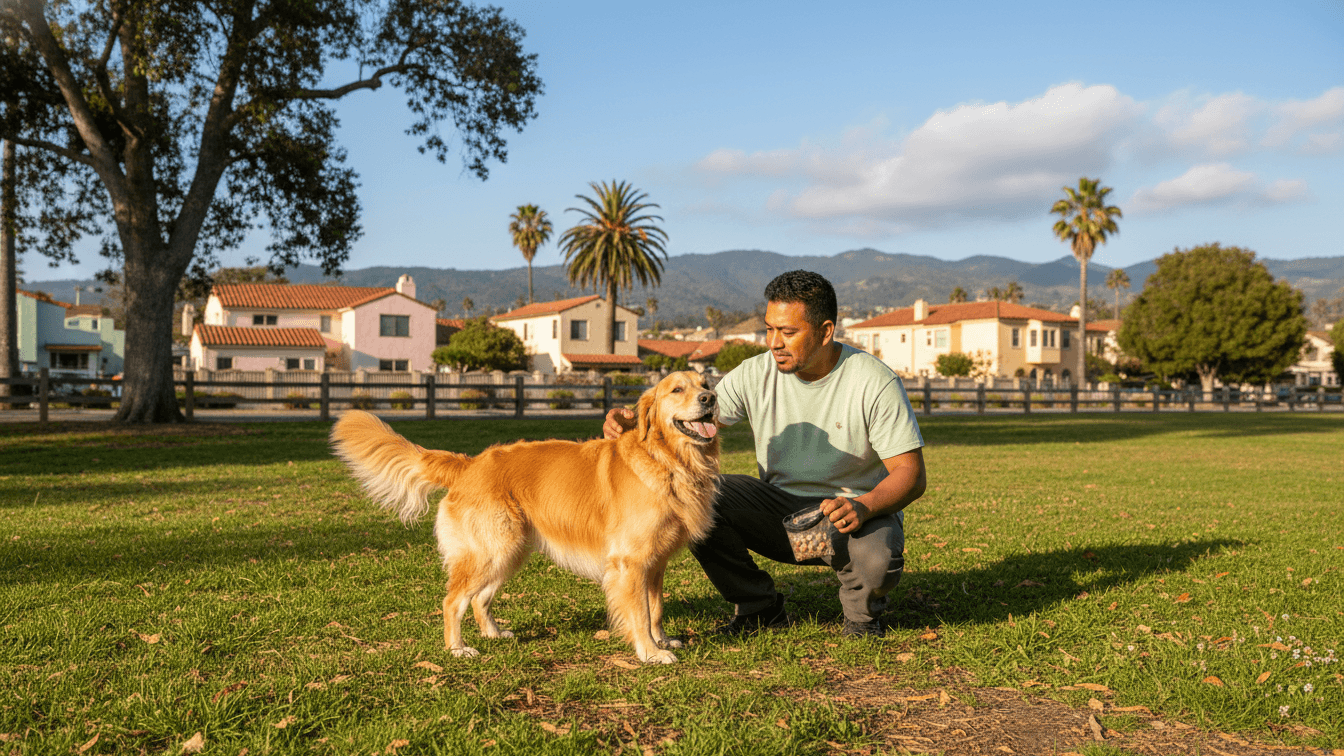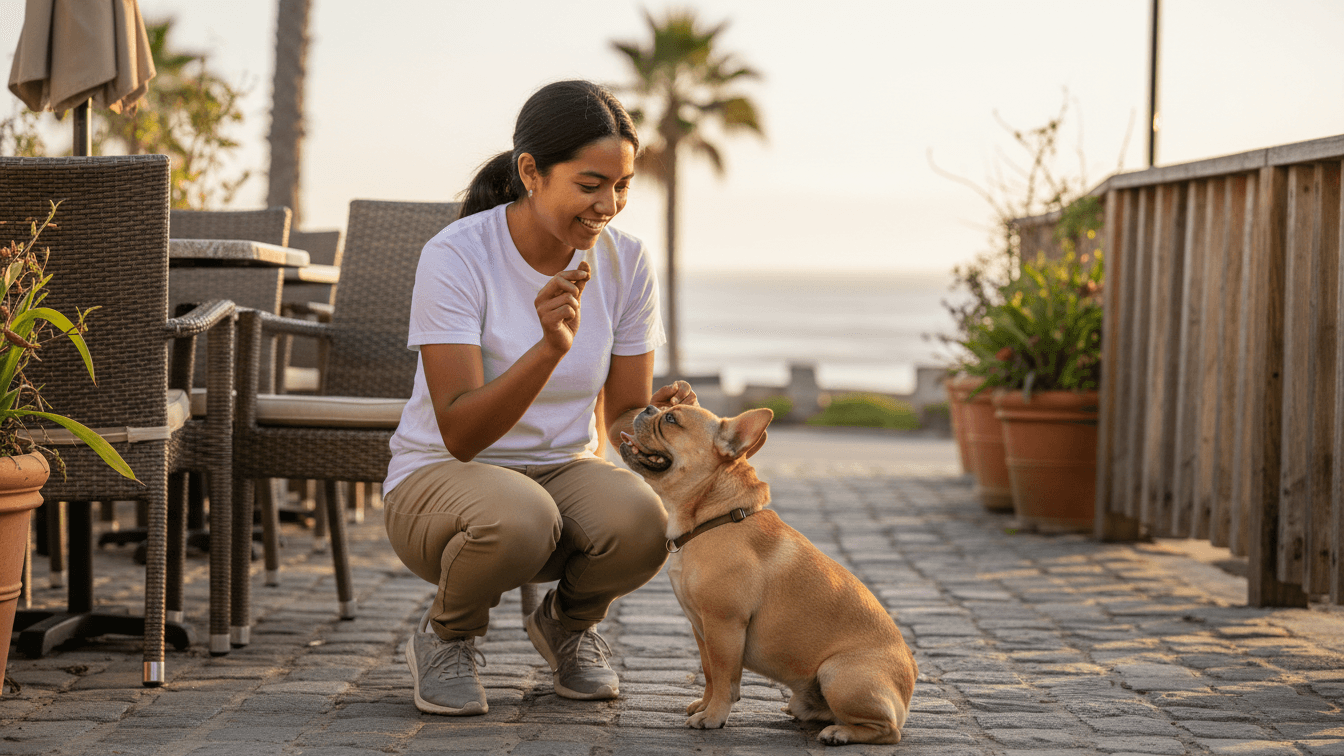Your Complete Guide to Choosing a Dog Trainer in Santa Cruz and Surrounding Areas
Living with a dog in Santa Cruz means you’ll be navigating busy downtown sidewalks near Pacific Avenue, spending time at beach access points along West Cliff Drive, and handling the unique challenges of a college town environment. Your dog needs to stay calm when crowds gather for First Friday events, walk politely past the wharf, and remain focused around surfers, cyclists, and the constant flow of UC Santa Cruz students.
Santa Cruz sits in Santa Cruz County, where local rules reflect both the city’s beach culture and its tight-knit residential neighborhoods. When you find a professional dog trainer who understands these local details, you’ll get better results both at home and out in your community.
How to Choose the Right Trainer
Start by looking for someone who uses positive reinforcement training and can set realistic goals for your Santa Cruz lifestyle. This means your dog should learn to walk calmly on West Cliff Drive, stay focused near busy spots like the Santa Cruz Beach Boardwalk, and handle vet visits without drama.
Credentials give you a quick way to compare trainers’ experience levels. Common dog trainer certifications include KPA-CTP, CPDT-KA, or IAABC-CDBC for behavior problems. If your dog has serious aggression issues, look for someone with CBCC-KA or a science-based program like CTC.
In-home dog training works great for puppy training, door greetings, and neighborhood leash skills. Group classes make sense once your dog can focus around other dogs, especially before you try busy spots like Seabright Beach or downtown events.
Common Dog Training Methods Explained

Reward-based methods build the trust you want while creating lasting behavior changes. They also help your dog follow Santa Cruz’s leash laws and noise ordinances that keep beaches and neighborhoods peaceful.
Basic obedience covers sit, down, stay, place, recall, and leash training so your dog can handle walks, outdoor patios at Abbott Square Market, and park visits without pulling or jumping on people.
Puppy classes focus on socialization, potty training, bite control, crate comfort, and early leash skills. Starting with short, positive training sessions prevents bad habits from forming in the first place.
Behavior modification addresses fear, reactivity, resource guarding, or separation anxiety through careful desensitization and counterconditioning. For serious cases, ask if your trainer works with local veterinarians.
Private lessons and in-home sessions let you customize everything around your daily routines, while day training can speed up results when you’re short on time. Board and train programs offer intensive work for complex issues, though you’ll need to maintain the progress once your dog comes home.
Dog training classes help your dog practice good manners around other dogs and people. The best classes give dogs plenty of space, screen participants carefully, and teach calm behavior rather than just excitement.
Specialized training like therapy dog training or service dog training requires extra structure, public-access skills, and a very clear step-by-step program. These advanced training programs demand consistency and patience.
Stay away from trainers who use fear, intimidation, or pain to get results. Humane dog training services are safer for everyone, easier to maintain long-term, and much better for keeping peace with your neighbors.
Average Cost of Dog Training in Santa Cruz, CA and Surrounding Areas (Updated for 2025)
Prices around Santa Cruz and Santa Cruz County depend on the trainer’s experience, how long sessions last, and where the training happens. Here’s what most local pet owners are paying in 2025.
| Service Type | Average Cost (Santa Cruz/Santa Cruz County) |
|---|---|
| Puppy classes (4-6 weeks) | $175-$325 total |
| Group obedience training (4-6 weeks) | $180-$350 total |
| Private lessons (60-90 min) | $125-$225 per session |
| In-home coaching packages (4-6 visits) | $500-$1,100 total |
| Day training (trainer works your dog + handoff) | $550-$1,100 per week |
| Behavior consult for reactivity/anxiety (initial) | $175-$300 |
| Board and train (2-4 weeks) | $2,500-$5,500 total |
You’ll probably pay extra travel fees for longer distances within Santa Cruz County, and expect higher rates for complex behavior work like aggressive dog training or severe separation anxiety.
Make sure you understand what’s included, how the trainer tracks progress, and whether they offer a free consultation or free evaluation before you sign up.
Questions to Ask a Potential Dog Trainer
- What training methods do you use, and how do you keep sessions positive and low-stress?
- What credentials do you have, like KPA-CTP or CPDT-KA? Do you keep up with continuing education such as CPDT-KSA?
- How will you customize the training program for my dog’s specific needs and our Santa Cruz lifestyle?
- Do you offer in-home visits, dog training classes, or day training, and which approach fits my goals best?
- How will we measure my dog’s progress and know when to add more distractions like beach crowds or skateboarders?
- What are the total costs, including any travel fees, and what’s your cancellation policy?
- Do you carry liability insurance, and can you show me proof?
- For behavior problems, will you work with my veterinarian if needed?
- What should I practice between our training sessions to help my dog keep improving?
Local Santa Cruz Rules and Considerations
Santa Cruz enforces specific leash laws and noise ordinances to keep beaches, parks, and neighborhoods safe for everyone. Understanding these local rules will help your dog become a well-behaved member of the community.
Leashes are required in most public spaces within Santa Cruz city limits. Dogs must be on leash no longer than 6 feet in all city parks, beaches, and public areas except inside designated off-leash areas. The city is very serious about these rules, especially during busy tourist seasons.
California law requires current rabies vaccination for all dogs, and Santa Cruz County follows these state requirements strictly. You can get vaccinations through county clinics or your regular vet.
Santa Cruz has strict noise ordinances that apply to excessive barking, particularly important in the city’s dense residential neighborhoods like Seabright and the Westside. Work with your trainer on alert barking and separation anxiety before neighbors start complaining, as animal control takes these complaints seriously.
The city requires commercial dog trainers to obtain business licenses, and those conducting dog obedience training in city parks may need additional permits and proof of liability insurance. If your trainer wants to use beach areas or parks for training for dogs, they should have proper authorization.
California doesn’t require special licenses for expert dog trainers, but if a business boards dogs for payment, the state's Animal Care Program oversees kennel licensing. You can find more details through the California Department of Food and Agriculture.
Santa Cruz County Animal Shelter provides resources for lost pets, low-cost vaccination clinics, microchips, and licensing information. They also handle animal control enforcement throughout the county.
Local Santa Cruz and Surrounding Areas Resources for Dog Owners
These spots give you great places to practice polite manners, work on recalls, and provide safe enrichment to help your dog. Always follow the posted rules and etiquette guidelines.
- Lighthouse Field State Beach Dog Park offers fenced areas with separate spaces for small and large dogs. Practice recalls and calm greetings during quieter morning hours before the afternoon crowds arrive.
- Chanticleer Park Dog Park in Live Oak provides a fenced off-leash area that’s perfect for working on socialization and recall skills in a controlled environment.
- Neary Lagoon Park allows leashed dogs on its walking trails, giving you a peaceful spot to practice loose-leash walking and focus work around ducks, herons, and other wildlife.
- DeLaveaga Park trails welcome leashed dogs and offer varying terrain for building confidence and practicing trail manners away from beach crowds.

FAQs
How much does in-home dog training cost?
Most Santa Cruz trainers charge $125-$225 per in-home visit, with discounts available when you buy packages. Complex behavior problems like reactivity or aggression typically start at the higher end of that range.
Is in-home dog training worth it?
Absolutely, because you’re working on problems exactly where they happen. Your trainer can fix door manners, jumping on guests, counter-surfing, and yard reactivity right at home, then step outside to practice leash skills on your actual neighborhood sidewalks near West Cliff or along the harbor.
Can you pay someone to house train your dog?
Yes, many trainers offer puppy programs that include potty training, crate routines, and daily schedules. Day training can speed up the process while teaching you how to maintain the progress.
What is the 3-3-3 rule for dog training?
This is a helpful timeline for new or adopted dogs: expect about 3 days for your dog to decompress, 3 weeks to learn your routines, and 3 months to feel completely settled. Good training plans work with this natural adjustment period.
How long will it take to reach my training goals?
Most puppies and friendly adult dogs show solid progress within 4-8 weeks if you practice daily. Fear, reactivity, or aggression typically requires several months of careful behavior modification with gradual increases in difficulty.
What should I bring to group classes?
Pack a flat collar or harness, a 6-foot leash, high-value treats, water, and current vaccination records if your trainer requests them. Leave retractable leashes at home for safety reasons.
What’s the leash law in Santa Cruz?
Dogs must be leashed and under control in all public areas within Santa Cruz city limits, except inside designated off-leash dog parks. The maximum leash length is 6 feet. This applies to all beaches, parks, sidewalks, and public spaces. Violations can result in fines.
Do I need a dog license in Santa Cruz or Santa Cruz County?
Yes, Santa Cruz County requires all dogs over 4 months old to be licensed. You’ll need proof of current rabies vaccination to obtain a license. Licenses must be renewed annually and can be purchased through Santa Cruz County Animal Shelter or online through the county website.
What shots does my dog need in Santa Cruz County or California?
Rabies vaccination is required by California state law for all dogs. Your veterinarian may also recommend distemper-parvo combination vaccines and bordetella based on your dog’s lifestyle and exposure to other dogs. Check current state guidelines through the California Department of Public Health.
Are dog trainers required to be licensed in Santa Cruz or Santa Cruz County or California?
California doesn’t require special certifications or licenses specifically for dog trainers. Trainers follow normal business regulations and need city business licenses to operate. However, if they offer board and train services, their facility may need to be licensed as a boarding kennel under state Animal Care Program regulations.
Where can I practice off-leash recall?
Use fenced dog parks like Lighthouse Field State Beach Dog Park or Chanticleer Park Dog Park to keep things safe and legal. Try visiting during quieter hours when you’re starting out to minimize distractions.
Which dog parks allow training around Santa Cruz and surrounding areas?
Lighthouse Field State Beach Dog Park and Chanticleer Park Dog Park both allow off-leash play within their fenced areas. These spaces are ideal for practicing recalls, socialization, and building confidence around other dogs in a safe environment.
What beaches or trails allow dogs for training?
Santa Cruz has limited beach access for dogs. Mitchell’s Cove Beach allows leashed dogs year-round, while most other city beaches prohibit dogs from 10 AM to 5 PM between May and September. Natural Bridges State Beach allows leashed dogs in certain areas. For trails, DeLaveaga Park and Neary Lagoon Park welcome leashed dogs and provide excellent training opportunities around wildlife and varying terrain. Pogonip Open Space Preserve also offers miles of trails where leashed dogs can practice focus and loose-leash walking.
How do I find the best dog trainer for my needs?
Look for a certified dog trainer who uses positive reinforcement methods and has experience with your specific training goals. Check credentials, ask about their training program structure, read reviews from other Santa Cruz dog owners, and take advantage of any free evaluation they offer. The right trainer should understand local challenges like beach distractions, tourist crowds, and urban wildlife.
What if my dog is reactive to bikes and skateboarders?
This is a common challenge in Santa Cruz given the high volume of cyclists and skateboarders, especially near the beach and downtown. A qualified trainer experienced in behavior modification can help your dog build positive associations through gradual exposure and counterconditioning. Start training in low-distraction environments before gradually working up to busier areas.
The right combination of thoughtful planning, humane methods, and consistent practice around Santa Cruz’s beaches and neighborhoods will help your dog become a confident, top dog in your community. If credentials matter to you, don’t hesitate to ask about dog trainer certifications and how your trainer stays current with new techniques.
